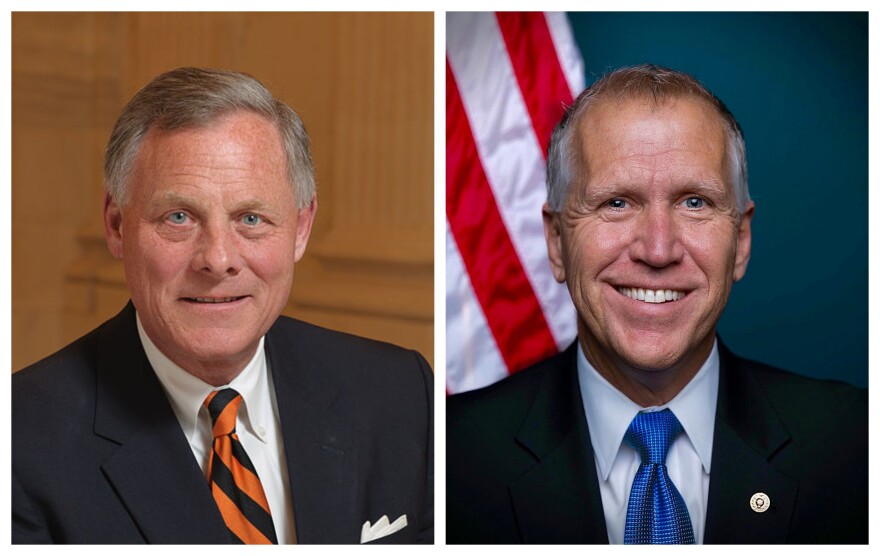Thom Tillis tweeted Friday morning that his colleague, fellow Republican Sen. Richard Burr, “owes North Carolinians an explanation” for Burr’s sale in February of up to $1.8 million in stock.
Burr, who is a co-chair of the Senate Intelligence Committee, had reportedly been receiving multiple briefings early in the year on the state of the COVID-19 pandemic -- the disease caused by the coronavirus -- and the danger to the United States.
Given the circumstances, Senator Burr owes North Carolinians an explanation. His self-referral to the Ethics Committee for their review is appropriate, there needs to be a professional and bipartisan inquiry into this matter, which the Ethics Committee can provide. (1/2)
— Senator Thom Tillis (@SenThomTillis) March 20, 2020
On Feb. 7, Burr co-wrote an op-ed on FoxNews.com that downplayed the risk to Americans.
He wrote: “Thankfully, the United States today is better prepared than ever before to face emerging public health threats, like the coronavirus, in large part due to the work of the Senate Health Committee, Congress, and the Trump Administration.”
Financial disclosure forms he provided to the Senate show that less than a week later, on Feb. 13, he sold up to $1.8 million in stock. The disclosure forms require senators to list the name of the stock sold and give a range of how much the stock was worth, so it’s difficult to know the exact value.
NPR reported that on Feb. 27, Burr gave a private speech to constituents who paid up to $10,000 to join the Tar Heel Circle: “There's one thing that I can tell you about this: It is much more aggressive in its transmission than anything that we have seen in recent history. It is probably more akin to the 1918 pandemic."
On Friday, Burr released a statement saying he did nothing wrong. He had previously said the NPR story was a "tabloid-style hit piece."
“I relied solely on public news reports to guide my decision regarding the sale of stocks on Feb. 13,” Burr wrote in his statement Friday. “Specifically, I closely followed CNBC’s daily health and science reporting out of its Asia bureaus at the time. Understanding the assumption many could make in hindsight however, I spoke this morning with the chairman of the Senate Ethics Committee and asked him to open a complete review of the matter with full transparency.”
My statement in response to reports about recent financial disclosures: pic.twitter.com/J4kye5a4ok
— Richard Burr (@SenatorBurr) March 20, 2020
For context, in the fall of 2019, former New York Rep. Chris Collins pleaded guilty to insider trading.
From a New York Times story:
"According to prosecutors, Mr. Collins — who rose to prominence as the first sitting member of Congress to endorse Donald Trump in the 2016 election — was at a congressional picnic in June 2017 when he learned, through a private company email, that Innate had failed a critical trial for a drug to cure multiple sclerosis. The drug, prosecutors said, was the company’s only significant product.
Immediately, Mr. Collins called his son, Cameron Collins, to encourage him to sell his shares before the test results became public."
Collins did not receive his inside information as part of his job as a congressman.
The non-profit Congressional Institute says members of Congress can be prosecuted for insider trading based on information they receive from their official duties as elected officials.
“Members of Congress come across a lot of information in the course of their official duties,” the group wrote in 2018. “Can they use 'insider information' to make a quick buck by buying and selling stock at opportune times?
The answer to this question is a resounding and unequivocal 'no.' Statutory law forbids it, and even if it did, Congress has always had the constitutional power to discipline its Members.”
But Susan Hennessy, executive editor of Lawfare and a fellow at the Brookings Institution, said Friday that Burr’s actions may not meet the standard of criminal insider trading.
The reason, she said, is that Collins had received information from inside the company that no one else had access to.
But what Burr did, Hennessey said, “still doesn’t pass the smell test. It may not be a criminal problem. But it’s a moral one.”
Click here for the latest coronavirus news on WFAE’s live blog.
Sign up here for The Frequency, WFAE’s daily email newsletter.
What questions do you have about the coronavirus? What has this experience been like for you? Share your questions below.
_





